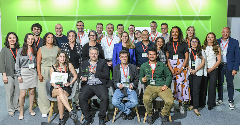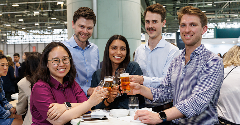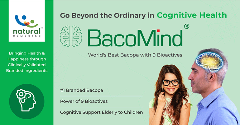News
Nestlé commits CHF22m to epigenetics research
29 Dec 2014Nestlé is to intensify its research in the field of epigenetics, the science of how eating behaviours and other environmental factors can affect genes, health and that of offspring, for future generations to come. The company has announced it will contribute CHF 22m to a six-year research partnership with an international alliance of researchers at institutions in Southampton, […]

 Nestlé is to intensify its research in the field of epigenetics, the science of how eating behaviours and other environmental factors can affect genes, health and that of offspring, for future generations to come.
Nestlé is to intensify its research in the field of epigenetics, the science of how eating behaviours and other environmental factors can affect genes, health and that of offspring, for future generations to come.
The company has announced it will contribute CHF 22m to a six-year research partnership with an international alliance of researchers at institutions in Southampton, Auckland and Singapore, who make up the EpiGen Consortium. The company said that the jointly-funded public-private partnership will be one of the largest of its kind.
Nestlé has been collaborating with the Consortium since 2011, studying how the diet and lifestyles of pregnant women influence the activity of their baby’s genes and how these subtle epigenetic changes impact the future healthy growth and development of their children.
“This is an important collaboration for Nestlé as it will help to better develop our understanding of the influence of nutrition and genetics at the beginning of life and continue to build our knowledge in this important area,” said the company’s Chief Technology Officer, Stefan Catsicas.
“To be involved in such cutting-edge research in such a vital and exciting field will enable us to create products that have a proven, positive impact on the health of mothers and their children. Ultimately, being a leading Nutrition, Health and Wellness company is about improving the quality of peoples’ lives.”
The collaboration aims to improve nutrition and reduce risk factors of pregnancy-related conditions such as gestational diabetes, a growing problem affecting about 20% of pregnancies in the South-East Asia region. Gestational diabetes is known to negatively impact the growth and development of children as well as the mother’s future health.
“Science shows that the nutrition infants and young children receive in the first 1,000 days from conception has a long-lasting influence on their health, wellness and quality of life,” said Heiko Schipper, CEO of Nestlé Nutrition.
“At Nestlé, we embrace this unique window of opportunity to nurture a healthier generation by providing them with science-based products.”
EpiGen’s member institutes and Principal Investigators welcomed the deepening of the collaboration.
“We are pleased that this important collaboration will build on the ongoing research into improving nutrition for mothers and their infants,” said the University of Southampton’s Keith Godfrey, Head of the EpiGen Science Management Group.
“The comprehensive expertise of EpiGen researchers combined with Nestlé’s scientific teams will ensure that we move closer to improving the health of future generations.
“One strength of the EpiGen Consortium is our ability to study mothers and infants across three very different populations, adding further insight into the relationship between genetic background and nutritional influences on disease burden for the mother and infant” he added.
Since its establishment in 2006, scientists from the EpiGen Consortium have made significant research discoveries in the areas of maternal and young child nutrition.
For example, EpiGen researchers have shown that the impact of nutrition in expectant women, such as a low-carbohydrate diet, is related to chemical changes in parts of their baby’s DNA, and that these changes can indicate a greater risk for these young children to become overweight or obese during childhood. (Godfrey KM et al, Diabetes 60:1528–1534, 2011).
The Nestlé scientists working in this research programme are based at Nestlé Research Center in Lausanne, the world’s largest, private food nutrition research organisation.
Related news

Has ‘clean’ had its day?
22 Dec 2025
Wielding clean-label positioning and fortification as marketing levers is a dangerous strategy, and brands would be better off explaining the hows and whys of the ingredients in their products, say experts.
Read more
Celebrating the winners of the Fi Europe Innovation Awards 2025
3 Dec 2025
Food industry stakeholders celebrated as the winners of the Fi Europe Innovation Awards were announced at a ceremony in Paris.
Read more
Alternative protein startups pivot to B2B ingredients amid funding shift
27 Nov 2025
Alt protein startups are pivoting from consumer meat analogues to high-value B2B ingredients, driven by stronger investor interest, better margins, and clearer commercial pathways.
Read more
Walmart Marketplace’s record growth prompts search for UK sellers
26 Sep 2025
Walmart’s third-party e-commerce platform, Marketplace, has witnessed extraordinary growth – but a need for more product diversity has prompted the retailer to recruit UK sellers.
Read more
The winners of Vitafoods Europe Startup Challenge 2025 revealed
29 May 2025
Four startups – Yomio Drops, PFx Biotech, Revobiom, and Favamole – took top prizes at this year’s Vitafoods Europe Startup Challenge awards.
Read more
East takes on West in the fight for future food flavours
30 Apr 2025
Asian and South American flavours are now key components on global menus, driven by a growing global appetite for culinary mashups.
Read more
Food companies urged to bring ‘joy’ and urgency to healthy food mission
14 Mar 2025
For too long, businesses have treated health and sustainability as separate agendas – but there is growing evidence to show diets that benefit human health can also enhance that of the planet, say experts.
Read more
Entries open for inaugural Vitafoods Europe Innovation Awards
29 Jan 2025
Entries are open for the inaugural Vitafoods Europe Innovation Awards, celebrating the ingredients, finished products, partnerships, and initiatives redefining the nutraceutical landscape.
Read more
Paris Olympics: Food and beverage brands champion health, fun, and sustainability
5 Aug 2024
Food and beverage brands are aligning with the Paris Olympics 2024 Food Vision, which emphasises sustainability, local sourcing, and plant-based diets.
Read more
Natural Remedies: Bringing health and happiness via validated branded ingredients
18 Apr 2024
Natural Remedies is an internationally renowned botanical healthcare company committed to advancing the field through rigorous research and the development of clinically validated Branded Ingredients. Guided by our foundational principle of ‘BEING USEF...
Read more